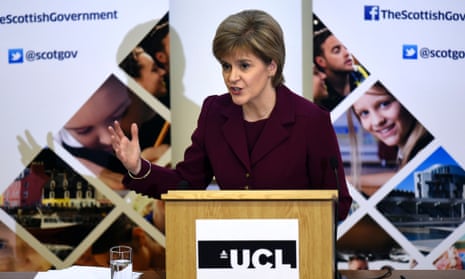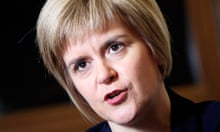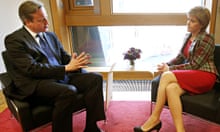Nicola Sturgeon has said the Scottish government will help to halt “the deeply misguided march to further austerity” at Westminster by making the kind of progressive arguments the Labour party is no longer willing to articulate.
In a speech at University College London on Wednesday, Sturgeon, Scotland’s first minister and Scottish National party (SNP) leader, suggested an alternative approach to austerity for the next parliament could result in £180bn extra being spent on public services by 2020.
Delivering a full-throated attack on the UK government’s austerity policy, which she described as morally unjustifiable and economically unsustainable, Sturgeon said: “Post-election, if we are in a position of influence, then I would hope that we could persuade the more progressive strands of opinion in the Labour party to see what we’re putting forward sits far better with the principles they profess to practice.”
Having warned before the speech that a Labour government would have to break the “cosy consensus” around cuts in order to win the support of SNP MPs after May’s general election, Sturgeon insisted as she took questions from the audience that her party was in a “radically different space” from Labour in terms of economic policy.
“I think Labour is far too slavishly attached to the Westminster fixation on deficit reduction in isolation,” she said. “I know there are many people in Labour, certainly within the wider Labour movement both north and south of the border, who will listen to what I’m saying today about deficit reduction and wish they had a Labour party that had the gumption and the guts to make these progressive arguments a bit more loudly than they do.”
Making her third visit to London over the past month, and with recent polls suggesting the SNP could hold the balance of power after May’s Westminster election, Sturgeon said she would not rule out a coalition with Labour but that she did not consider it the most likely option.
Describing the purpose of SNP MPs in Westminster as firstly to stand up for Scottish interests and secondly to seek to be part of a progressive alliance, Sturgeon added: “There are people in the Labour party who I’d agree on many things with. But I look at Plaid Cymru in Wales and the Greens in England and I think we might have more influence and ability to achieve things outside the rigidity of a formal coalition.”
Sturgeon told the UCL audience: “I’m going to talk about something that is not talked about nearly enough - the impact of austerity on individuals. I don’t think that any economic policy can be seen as a success, when it causes severe anxiety and misery to so many people – including many of our most vulnerable citizens.”
Criticising Westminster’s “entire focus” on deficit reduction, she argued: “The deficit is hugely important. But it’s a symptom of economic difficulties, not just a cause of them. And it cannot be seen entirely in isolation.
“In terms of the UK economy, we believe that debt should be reduced as a percentage of GDP – but more gradually than either of the largest UK parties is proposing.
“For example if you limited real terms growth in departmental spending to half a per cent each year – it would reduce debt as a share of GDP in every year from 2016-17. But it would also permit – compared to current UK government plans – a further £180bn of investment across the UK over the next four years.”
She said savings could also be released through “some very straightforward choices”, including deciding not to renew Trident, which would save about £100bn, at 2012 prices, over the next 35 years.
Arguing that the Scottish government’s approach was part of a growing international consensus, she concluded: “We simply don’t accept that there’s a trade-off between balancing the books and having a balanced society; fairness and prosperity can go hand in hand. Indeed, I’d put it more strongly – they must go hand in hand.”
Responding to the speech, the Conservative party’s chairman, Grant Shapps, said: “Now we know the price that the SNP would charge to support Ed Miliband if he became prime minister – a bill of £180bn paid for by hardworking taxpayers.
“More wasteful spending, paid for by borrowing and higher taxes, is a recipe for economic chaos. It’s clearer than ever that only David Cameron and our long-term economic plan can secure the recovery and build a brighter future for Britain.”
The secretary of state for Scotland, Alistair Carmichael, accused Sturgeon of trying to turn good news into bad, arguing that eliminating the deficit by 2018 was the fairest way to ensure economic success.
Carmichael said: “By cutting the deficit in half, we have restored economic credibility, got employment up to record levels, and achieved growth rates that the eurozone and most of the G7 would envy.
“In addition, we have increased pensions, cut income tax for low and middle earners and made major investments in childcare and the NHS. Nicola Sturgeon should welcome the progress we have made, in contrast to the economic fortunes suffered by many of our neighbours.”
The shadow Scottish secretary, Margaret Curran, said: “With Scotland’s A&E in crisis, Nicola Sturgeon thought making a big political speech in London was the best use of her time.
“Scotland can’t afford another five years of David Cameron, but voting for the SNP risks letting the Tories back into power. Every vote for the SNP in May is another boost for David Cameron, and makes it more likely the Tories will be the largest party across the UK after the election. In every election since women got the vote the largest party has gone on to form the government.”










Comments (…)
Sign in or create your Guardian account to join the discussion